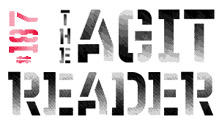
Live at Rockpalast
MIG
By the time Public Image Limited performed on German music television show Rockpalast in 1983, John Lydon’s original cohorts in the band, guitarist Keith Levene and bassist Jah Wobble, had abandoned him and PiL had been reduced to Lydon, drummer Martin Adkins, who had joined the fold in 1979, and three session players. While this line-up might sound like a recipe for blandness, it was this conglomerate that recorded the excellent Live in Tokyo record, and here they are in fine form as well.
For his part, Lydon plays his quintessential role as sardonic bandleader. Blowing boogers out of his nose between songs and at one point commenting, “I’m bored and I want to go home,” the singer is at his snotty best. However, he seems intent on exciting the audience, regardless of whether or not he entertains them. He prowls the stage like a caged animal, and tracks like “Religion” and “Memories” are coiled with a vehemence not entirely expressed in PiL’s groove-laden minimalism. When they surprisingly break into “Anarchy in the UK,” the notorious song seems mild by comparison, its punk spirit seeming not nearly as tempestuous as the darkened spirit of Lydon’s subsequent endeavor.
Recorded before PiL released This Is What You Want... This Is What You Get, this DVD captures the band as its pinnacle, at least in terms of songs, if not personnel. But while you can fault bassist Louis Bernardi for his tuxedo shirt and gold tie, his mustache and his mullet, you can’t knock his playing. Similarly, guitarist Joseph Guida looks somewhat ridiculous in a Phillies t-shirt and thin suspenders, but his riffs are razor sharp. They help these early performances of “(This Is Not a) Love Song” and “Bad Life” ripple with virility. Indeed, nearly everyone seems at odds with Lydon’s sneering veneer, but that doesn’t stop them providing the perfect accompaniment.
The band first leaves the stage after the aforementioned “Anarchy in the UK.” Despite Lydon’s insistance on his boredom, he returns for encores three times before the band finishes with a second run through “Public Image.” (They also opened the show with the signature song.) The German audience is no more enthusiastic than your average crowd, and one wouldn’t know the performance was for Rockpalast if it wasn’t for the neon signs with the show’s name flanking the stage, so it has to be Lydon’s own satisfaction that elicits the additional songs. Whatever the case, we are the ones who benefit, with PiL captured at a critical moment in its history. Hence, it’s hard not to be appreciative.
Stephen Slaybaugh
Fela!
The Rock of Art
The Book of Drugs
The Gories Live Review
Jeff Mangum and Califone Live Reviews
Scud Mountain Boys Live Review
Kill All Redneck Pricks: A Documentary Film About a Band Called Karp
Death of Samantha Live Review
Kathryn Calder and Mark Eitzel Live Review
The Ballad of Mott the Hoople
I Want My MTV: The Uncensored Story of the Music Video Revolution
Lindsey Buckingham Live Review
Scratch Acid Live Review
Def Jam Recordings: The First 25 Years of the Last Great Record Label
